2005 CCJ Notes
|
Election Dissection and Mayoral Ramblings
The 2005 Municipal Election is now past and most of the elected members of the City Council are meeting here and there in search of five votes to become Mayor. Politically minded people around Cambridge are in full-blown speculation mode trying to figure out who will be successful in securing the necessary votes and what, if any, concessions will have to be given in exchange for votes.
There are many valid criteria that can be used by the councillors in determining their Chair. The Mayor will appoint all the Council committees and their chairs, so that's certainly a factor. The Mayor also becomes the Chair and 7th voting member of the School Committee, and this is a factor used by some councillors in their choice for who should be mayor.
Who gets to be the Vice-Chair has sometimes been a factor in the decisions. There is no mention of a “Vice-Mayor” in the City Charter, only a vice-chair who has no special status or privileges other than to stand in for the mayor in his or her absence. That said, the person elected “Vice-Mayor” has often been a councillor who played a pivotal role in the election of the mayor.
One criterion that could be used to determine who is to be mayor is the City Council ballots. Because these are preferential ballots on which voters can rank as many candidates as they wish in ranked order, it is possible to simulate an “Instant Runoff” election by allowing only those candidates who were elected to the Council to receive ballots and to continuing the transfer of ballots until just one candidate remains. Using the 2005 City Council ballots and the same software used in the Cambridge elections, Henrietta Davis would edge out Anthony Galluccio by a thin 64 vote margin.
Here's the transfer report: Instant Runoff Mayor Simulation - 2005 (PDF)
Another election that takes place on Inauguration Day 2006 is the Vice-Chair of the School Committee. The Vice-Chair makes all the committee appointments, so it can be a significant position. We can also use the 2005 School Committee ballots to do an Instant Runoff simulated election for this position. In this case, Nancy Walser would win out over Fred Fantini in the deciding round by a significant margin.
Here's the transfer report: Instant Runoff School Committee Vice-Chair Simulation - 2005 (PDF)
People can interpret (or discard) this information as they please, and everyone should bear in mind the many factors that should be considered as the elected officials make their decisions. What I read from all of the ballot information and the election results is that Cambridge is undergoing a socioeconomic shift and this shift is now being reflected in the electorate. Some have said that this favors “progressive” candidates, but I'll hold off on that until someone comes up with a decent definition of the word “progressive.” – RW |
|
Nancy Walser Elected Secretary-Treasurer of the Massachusetts Association of School Committees
Cambridge School Committee member Nancy Walser was elected one of the top five officials representing 2200 school committee members throughout the state, the first representative from Cambridge to join the MASC's top leadership.
Walser was elected Secretary-Treasurer by the Delegate Assembly of the Massachusetts Association of School Committees (MASC) on Wednesday, October 26 during the MASC's annual convention in Worcester.
“This is the first time a member of the Cambridge School Committee has held office in the MASC,” said Glenn Koocher, MASC Executive Director and a former member of the Cambridge School Committee. “As an officer, Walser will be able to bring Cambridge issues to the forefront of the state's education agenda,” he said. “She'll have direct access to the Education Commissioner and will sit on the Local Government Advisory Committee, which meets monthly with the Governor.” The job is voluntary and non-paid, he added.
“As someone who has been fighting for fair school finance, we are delighted to have Nancy marching beside us,” said MASC President-Elect Maurice Hancock, a Brockton School Committee member who was lead plaintiff in Hancock v. Driscoll. “She has the ability to ask the tough questions and to be persistent with grace. I am looking forward to working with her to create a more supportive climate for public schools in Massachusetts.”
As chair of MASC's Division II and a member of the MASC Advocacy Committee, Walser has testified before the state legislature on behalf of a charter school moratorium and measures to change the charter school funding formula. She also co-organized last spring's statewide “Fund the Future” rally to reverse the cumulative budget cuts to Chapter 70 local school aid since 2002. |
A new State legislative change requires the counting of overseas absentee ballots, mailed on or before Election Day, up to 10 days following a municipal election. Final results for the November 8 election may not be available until November 18. Official results will be announced by the Board of Election Commissioners after overseas absentee ballots have been counted and added to the totals from the Count on Wednesday.
Also important to note is that voters in the City Election on November 8 will for the first time be informed of apparent errors on their ballots and given the opportunity to correct errors. The Cambridge Election Commission instituted reforms to ensure that every vote is counted as the voter intended by taking advantage of changes mandated by the Help America Vote Act (HAVA). Ballot scanners will eject apparently incorrectly marked ballots. When ballots are ejected, display cards inform the voters why the ballot was ejected. Voters will be given an opportunity to correct their error on the original ballot or to cast a new ballot. If the voter does not wish to correct the apparent error, the ballot may still be entered into the ballot box and valid votes on the ballot will be counted. In no case does anyone but the voter see the voter’s ballot.
Ballots will be ejected for three reasons: 1) Duplicate Rank, which shows the same number for more than one candidate; 2) Multi-voted Candidate, which shows more than one vote for the same candidate; or 3) Ballot read as blank, where ballot either has no marking or markings cannot be read by the scanner. In order for the scanner to read a mark, the numbered oval must be completely filled in with black pen.
The system of ejecting over-voted ballots (examples 1 and 2 above) was implemented in the November 2004 election, as mandated by HAVA and must now be used in all federal and state elections. The Board of Election Commissioners has extended this HAVA provision to City Elections as well to ensure that every voter has the opportunity for his or her ballot to be counted in full.
“The People’s Guide to Voting in Cambridge”, featuring George Goverman (Auditor of The Count) and Robert Winters (yes, that's me!) is an hour-long program that attempts to explain how proportional representation (PR) elections work in Cambridge. It was recorded on October 16 and is moderated by John Donovan of CCTV. [Your comments on the program are appreciated. – RW]
Nov 2 - The "Random Draw of Precincts" took place today at the Cambridge Election Commission. This determines the order in which ballots from precincts throughout the city are counted in the election. Though this has a relatively minor effect on the tabulation of the ballots (because of the "Cincinnati Method" used to transfer surplus ballots), it can potentially make a difference in a very close election. Here's the ordering determined by lottery (read down the columns):
6-1
2-2
3-3 |
1-1
3-1
9-2 |
5-3
6-3
11-2 |
3-2
9-3
10-1> |
1-2
4-3
10-2 |
8-1
11-1
10-3> |
2-1
2-3
11-3 |
4-1
7-1
5-2 |
7-2
9-1
8-3 |
8-2
4-2
5-1 |
7-3
1-3
6-2 |
October 21 - I just got back from another in a series of meetings of the City Council's Finance Committee and the Special Committee on the Property Tax. The first thing I'd like to say is that this working committee has been one of the best examples I've witnessed of a substantial and productive city committee in which elected officials, City administration, and members of the public (with some notable exceptions) have worked cooperatively and creatively to address some of the issues that arose last year in connection with property tax assessments. My respect for Brian Murphy (Chair of the committee), Mayor Michael Sullivan, and Councillor David Maher in particular has soared based on their grasp of all the issues and their willingness to explore new options. Other councillors have contributed to the debate, but these guys have been standouts.
Two of the more substantial ideas being discussed within the committee are primarily responses to the shortcomings of laws and regulations determined almost 20 years ago. Specifically, the property tax classification (residential vs. commercial, etcetera) that allows for different tax rates for each classification may need some tweaking by subdividing the residential class to take into account some of the fundamental differences between single-family homes, multi-family homes, and condominiums. There were, in fact, almost no condominiums in the Commonwealth when the property tax classification system was established. If the residential class were subdivided, it is possible that the residential exemption could be determined independently within each class.
The residential exemption (a flat 30% of the citywide average value of all residential properties) has the unintended consequence of lowering the taxable value (and the tax) on some properties (most notably condominiums) so low that an “alternative minimum” provision kicks in. The owners of these properties have to pay tax on a a minimum of 10% of the assessed value of the property. In some cases, this minimum tax is lower than bus fare. Not a bad deal for police and fire protection, good roads, free public schools, access to a high quality water supply, and more.
None of these changes are possible unless the state legislature adopts these changes. There is some belief that the legislature may be more willing to go along with a statewide changes with local options rather than a home rule petition that would only be applicable to Cambridge. However, changes to the law are unlikely if they would provide relief only to Cambridge or if there are any potential negative effects elsewhere in the state. Making any changes a local option would seem to address this concern, but even in the best scenarios the state is often very slow to act.
Some of the discussion at this morning's meeting concerned ways to get the local universities to pay a more appropriate share of taxes than is now the case. Any such changes would be very difficult, especially in the case of Harvard University whose protection is enshrined into the Massachusetts state constitution. (Harvard has been here considerably longer than the Commonwealth of Massachusetts.) Mayor Sullivan was speaking about an idea that major nonprofit and educational institutions might pay property tax on a percentage of the full taxable value of their property, e.g. maybe 10%. This would not be such an easy thing to do because universities are unique in that there is no solid basis of comparison on which to base the assessments. Memorial Hall, for example, has no comparable sales data. This gave me the idea that a potentially fair method of taxing the universities and other large nonprofit institutions would be just on the value of the land they occupy. Coming up with a baseline assessment for the land value would be much simpler than considering all the structures built on the land and their various uses. Committee Chair Brian Murphy immediately noted the similarity of this idea to the philosophy of Henry George. I believe it's an idea worth considering for determining a fair way to get universities to pay a more appropriate share of local property taxes without inappropriately intruding into what the universities should or should not be doing within their campuses. – RW
On Monday, September 26 at 6:30pm, there was a hearing during the City Council meeting on the FY06 property tax rates. At last year's hearing on this topic, we first learned about what was to become a controversial tax year with owners of small multifamily homes in various locations throughout Cambridge being hit with steep increases in their property taxes. This year promises to be far less controversial.
Compact PDF of the City Manager's message on the FY2006 tax rate Original Word document on City web site
Sept 12 - City Hall
The City Council is back in session at City Hall this Monday, September 12. There are 229 Council Resolutions and 60 Council Orders on the agenda for the meeting. Of these, 74 concern Iraq. [Actually, all of the Iraq resolutions come from the Vice-Chair.]
In addition to a number of rodent orders and Hurricane Katrina orders, there are several policy orders that deal with property taxes. Councillor Decker asks the Manager to reexamine the assessment process where there have been inconsistencies on the same street or block. [This has been discussed by Councillor Maher and others numerous times at the committee meetings that Ms. Decker has steadfastly avoided.] Councillors Decker and Galluccio have an order calling for a home rule petition to establish a base line tax amount for every residential property. [Councillor Galluccio has discussed this in committee meetings. It's one way to address the fact that due to the residential exemption, some condominium owners don't pay their “fair share.” Of course “fair” is a matter of opinion and, like landlords and tenants during the rent control era, it makes a difference whose ox is gored.]
Councillor Toomey has two orders calling for home rule petitions to (a) allow the City to impose a real estate transfer fee, and (b) a 3% real estate agent fee surcharge. Councillor Toomey also asks for a home rule petition to allow the City to collect an endowment surcharge - clearly targeting Harvard and MIT.
The Hurricane Katrina orders tell an all-too-familiar tale of this 2004-2005 City Council. There is one set of orders coauthored by several councillors and the mayor, and a redundant set of of orders from Councillor Decker. This has been a Council of eight plus one. The eight, for the most part, work effectively together.
Cambridge Candidate Pages
Requests for statements on a range of topics were sent on Sept 2 to all candidates for the City Council and School Committee. Check out the Cambridge Candidate Pages for what they have to say. Responses will be posted as they arrive. Here are the topic areas sent to candidates:
|
Cambridge City Council
Background
Top Priorities
Quality of Life and Public Safety
Traffic, Parking, and Transportation
Municipal Finance, City Budget, Assessments, and Property Taxes
Land Use, Planning, Economic Development
Human Services Programs
Open Space, Parks, and Recreation
Energy, the Environment, and Public Health
Housing
Arts and Public Celebrations
University Relations
Civic Participation
Cambridge Public Schools
Other |
Cambridge School Committee
Background
Top Priorities
Roles of the School Committee, the Superintendent, Parents, and the Public
Elementary School Programs and Administration
High School Programs and Administration
School Department Administration and the Budget
Teacher Evaluations and Teachers Contract
State/Federal Role in Local Education
Declining Enrollment
Charter Schools
Other |
Aug 30, 2005 - The conventional political wisdom is that older voters are the most dependable voters. Analysis of the data bears this out. Shown below are some histograms and statistics of Cambridge voters.
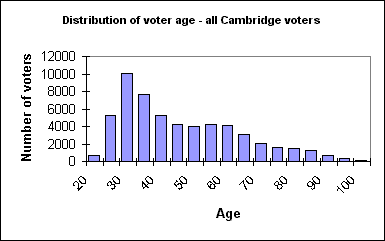
median = 39.07
mean = 43.74
number = 56162
Chart shows the distribution of current ages of all registered Cambridge voters (as of Aug 9). |
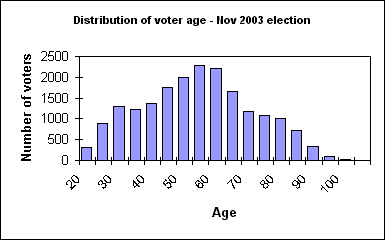
median = 51.97
mean = 51.84
number = 19430
Chart shows the distribution of ages (at the time they voted) of all currently registered Cambridge
voters who voted in the Nov 2003 municipal election. |
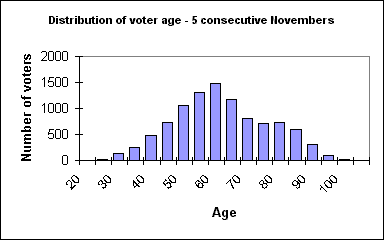
median = 58.29
mean = 59.43
number = 9908
Chart shows the distribution of current ages of all registered Cambridge voters who have voted in the November elections
every year starting in 2000. |
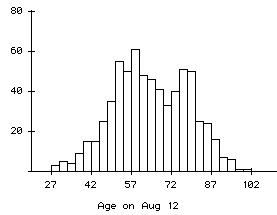
Finally, here's a histogram showing the age distribution of the 666 registered Cambridge voters (as of Aug 9) who have voted in 12 consecutive elections, including all primaries from 1998 to the present.
Their median age was 63.43 (on Aug 12) and their mean age was 64.40 years. The oldest such voter was 100 and the youngest was 28. |
Aug 17 – Cambridge just lost one of its greatest citizens. Cornelia Wheeler, former city councillor (1958-1967) and civic leader who helped bring Plan E government to Cambridge in 1940, died peacefully on Sunday, August 14. Connie was a great benefactor to her city. Her generosity brought the Wheeler Water Garden to Danehy Park in North Cambridge. Though almost 90 at the time, Connie celebrated the dedication of the fountain by kicking off her shoes and running through the fountain with all the kids. Connie Wheeler was one of a kind.
Steve Buckley's Oldtime Baseball Game took place on Wed, Aug 17 at St. Peter's Field.
Pictures from the 2005 game may appear later. |
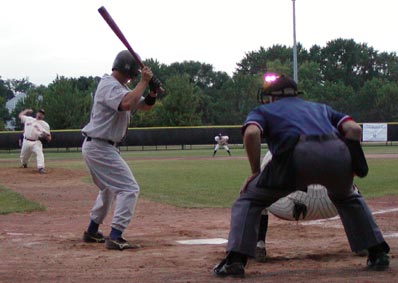
Jim Corsi pitching in the 2002 game |
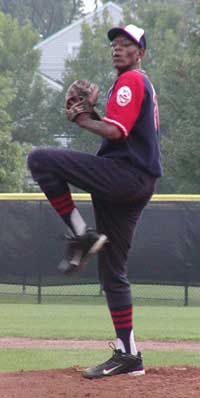
Dennis "Oil Can" Boyd in 2004 |
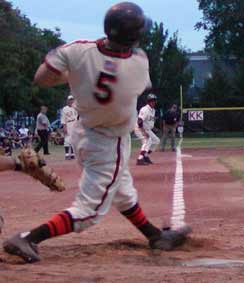
Taking a swing in 2002 |
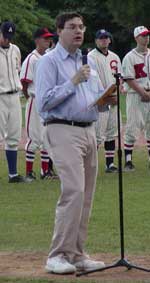
Play-by-play announcer
Glenn Koocher introducing
the players in 2002 |
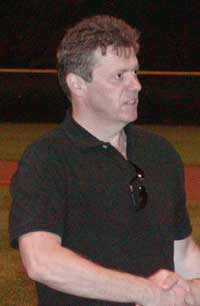
Steve Buckley at the 2004 game |
| Aug 16-17, 2005: There was no water on much of Broadway Tuesday night as workers from the Water Department and South Shore Pipeline worked through the night to replace a section of 30 inch water main. Water was restored by 8:00am. |
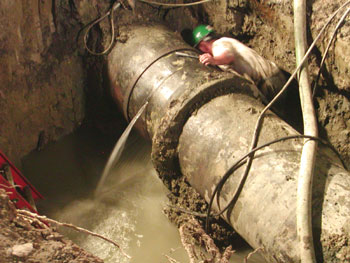
Cutting the pipe |
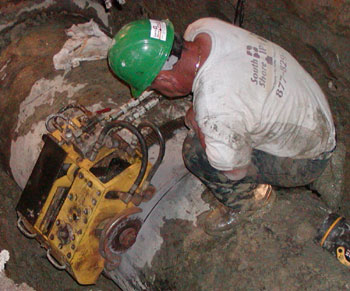 |
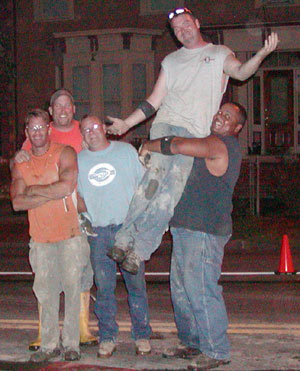
Local heroes who get the job done |
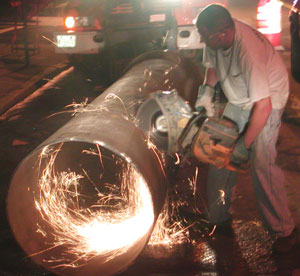
Cutting the new pipe |
Aug 5 - There will be 18 candidates on the City Council ballot and 8 candidates on the School Committee ballot this year. All of these candidates were certified by the Election Commission on Wed, Aug 3. Four people who pulled papers for City Council (Jeff Chase, Mary Anne Fox, Kathryn Podgers, and Sam Lover Seidel) and one person who pulled papers for School Committee (Mary Piemonte) did not file any signatures and will not be on the ballot. The candidates who will be on the ballot are shown in the chart below.
In case you were wondering how many candidates have been on the ballot over the years (yeah, I know - it never crossed your mind), here are the numbers:
| Number of Candidates on the Cambridge Municipal Ballot: 1941 - present |
| Year |
CC |
SC |
|
Year |
CC |
SC |
|
Year |
CC |
SC |
|
Year |
CC |
SC |
|
Year |
CC |
SC |
|
Year |
CC |
SC |
|
Year |
CC |
SC |
| 1941 |
83 |
28 |
1951 |
27 |
15 |
1961 |
23 |
16 |
1971 |
36 |
22 |
1981 |
25 |
13 |
1991 |
19 |
12 |
2001 |
19 |
10 |
| 1943 |
39 |
19 |
1953 |
35 |
18 |
1963 |
22 |
17 |
1973 |
34 |
26 |
1983 |
16 |
16 |
1993 |
29 |
11 |
2003 |
20 |
8 |
| 1945 |
37 |
14 |
1955 |
41 |
19 |
1965 |
24 |
13 |
1975 |
25 |
16 |
1985 |
22 |
9 |
1995 |
19 |
11 |
2005 |
18 |
8 |
| 1947 |
34 |
18 |
1957 |
35 |
26 |
1967 |
20 |
18 |
1977 |
24 |
10 |
1987 |
19 |
13 |
1997 |
19 |
8 |
|
|
|
| 1949 |
40 |
16 |
1959 |
31 |
21 |
1969 |
26 |
14 |
1979 |
23 |
12 |
1989 |
28 |
8 |
1999 |
24 |
13 |
|
|
|
|
| Candidates for Cambridge City Council (18) – Final List |
| Name |
Address |
Occupation |
Signatures filed |
# Valid |
| Lawrence J. Adkins |
45 Hayes St., 02139 |
- |
93 (July 11) |
87 |
| James Condit |
164 Raymond St., 02140 |
programmer |
59 (July 27,29) |
58 |
| Henrietta Davis |
120 Chestnut St., 02139 |
city council |
69 (July 20,25) |
64 |
| Marjorie Decker |
42 Linnaean St. #3, 02138 |
city council |
73 (July 25,26) |
70 |
| Anthony Galluccio |
27 Sunset Rd., 02140 |
city council |
100 (July 25) |
94 |
| Jesse Gordon |
175 Richdale Ave. #315,
02140 |
analyst |
82 (July 12,21,29) |
75 |
| Andre Green |
56 Plymouth St. #3, 02141 |
IT consultant |
54 (July 13,29) |
53 |
| Robert L. Hall, Sr. |
364 Rindge Ave. #7K, 02140 |
economist |
94 (July 12,13) |
56 |
| Bill Hees |
78 Dana St. #1, 02138 |
engineer |
69 (July 25,27,29) |
66 |
| Craig Kelley |
6 St. Gerard Terr., 02140 |
consultant |
99 (July 28) |
87 |
| Robert LaTrémouille |
30 Griswold St., 02138 |
lawyer |
87 (July 18,25) |
75 |
| David P. Maher |
120 Appleton St., 02138 |
city council |
100 (July 22) |
98 |
| Brian Murphy |
22 Mt. Auburn St., 02138 |
city council |
100 (July 12) |
96 |
| Kenneth E. Reeves |
340 Harvard St., 02139 |
attorney |
100 (July 28) |
67 |
| Sam Seidel |
48 Maple Ave., 02139 |
consultant |
98 (July 18,29) |
87 |
| E. Denise Simmons |
188 Harvard St. #4B, 02139 |
city council |
97 (July 19) |
77 |
| Michael A. Sullivan |
42 Huron Ave., 02138 |
city council |
100 (July 21) |
95 |
| Tim Toomey |
88 Sixth St., 02141 |
city council |
100 (July 6) |
100 |
|
| Candidates for Cambridge School Committee (8) – Final List |
| Name |
Address |
Occupation |
Signatures filed |
# Valid |
| Alfred B. Fantini |
4 Canal Park #203, 02141 |
deputy treasurer |
100 (July 7) |
98 |
| Joseph G. Grassi |
393 Cambridge
St., 02141 |
sch. committee |
99 (July 28) |
90 |
| Richard Harding Jr.
|
187 Windsor St., 02139 |
administrator |
100 (July 29) |
83 |
| Ben Lummis |
316 Walden St., 02138 |
educ.
consultant |
70 (July 29) |
61 |
| Marc McGovern |
15 Remington St., 02138 |
social worker |
100 (July 27) |
98 |
| Patricia Nolan |
184 Huron Ave., 02138 |
nonprofit mgr. |
63 (July 27,29) |
61 |
| Luc Schuster |
65 Eustis St., 02140 |
asst. teacher |
100 (July 11) |
78 |
| Nancy Walser |
335 Huron Ave., 02138 |
sch. committee |
92 (July 29) |
86 |
|
|
A minimum of 50 certified signatures are necessary for a candidate's name to be placed on the November
ballot. All candidates were officially certified by the Election Commission on August 3.
|
Need data? If you are a candidate in this year's election, I can provide current data in whatever format you prefer on registered voters and voter histories from Nov 1997 until now. I can also provide analysis of ballot data from the last four municipal elections. This can be useful in charting out your campaign. This is provided at no cost to reasonable, civil people. If you don't meet that criterion, don't even ask. - Robert W.
Campaign Finance Reports: 2001-2005 – updated June 10 (PDF)
|
July 6 - So, how much money do you really need to run for City Council in Cambridge?
Mayor Michael A. Sullivan just set a new record for most money raised in a single month by a City Council
candidate: $46,068.99 in the month of June. At the end of June, this gave him a total of $82,797.41 in his campaign account.
| Candidate |
$ in campaign account (July 6) |
| Sullivan |
$82,797.41 |
| Davis |
$34,293.86 |
| Murphy |
$14,740.86 |
| Maher |
$10,363.05 |
| Toomey |
$9,922.06 |
| Galluccio |
$9,183.75 |
| Simmons |
$7,222.54 |
| Seidel |
$4,889.38 |
| Kelley |
$4,649.31 |
| Reeves |
$3,984.90 |
| Gordon |
$2,221.58 |
| Green |
$1,400 (approx.) |
| Decker |
$52.88 |
June 5 Boston Globe article by Robert Gavin on Providence and Worcester: “Worcester was also hampered by its system of government, which divides power between an elected mayor and appointed manager and too often resulted in disputes, local observers said.” - Full Article
|
May 9 Testimony on Galluccio's flawed mayoral election proposal (Robert Winters)
It came as quite a surprise to see this Council Order on this week’s agenda, especially in light of the report of the last Committee meeting (Oct 13, 2004) which suggested not only more meetings on this subject, but that they be televised. No more meetings were held and public involvement has been nil.
I stand in opposition to this proposal on several grounds:
First: Under the Plan E Charter, the mayor does not run the city. His job is more akin to the City Council President in Boston, and I will remind you that the Boston City Council votes on who is to be their Chair.
Second: The proposed election method is the worst possible choice, especially in a city with our system of ranked, transferable ballots and runoffs. The proposed system where “whoever gets the most votes wins” is incompatible with our election system. We would be asking voters to rank their preferences on two ballots and “placing and X” on the third ballot.
To draw comparisons to Worcester is not a fair comparison. Worcester stopped using PR elections in 1958. Their current system came about in the mid- to late-80’s in response to a move toward a strong mayor system. The resulting compromise created a 11 member council with 5 district councillors and 6 at-large councillors. Voters can vote for up to 6 at-large candidates. This system has been challenged in Holyoke, Boston, and elsewhere because it is inherently unfair to minority groups. The overall Worcester population is 25% minority. Worcester Mayor Murray said that there is one Latino male councillor and one-woman councillor. I don’t think we should be emulating Worcester.
Mr. Rushford explained that the Worcester municipal election consists of four separate selections: district councillors, at-large councillors, school committee members and mayor. Voters can vote for up to six at-large candidates. There is a preliminary election that reduces the number of at-large candidates to 12. All those who are successful in the preliminary at-large election are automatically placed on the ballot for mayor in the final election unless they indicate in writing that they do not want to run for mayor. The person who wins the election for mayor must also win one of the six at-large council seats.
Please take note that even Worcester employs a preliminary runoff election. In Boston, though some of you may not remember this, if there are more than two candidates for mayor, a preliminary election is held to reduce the field to 2 candidates who then move on to the November general election. The proposal before you has no provision for a runoff election.
We also learned from the Worcester officials, contrary to one of the “WHEREAS” statements in the proposed Order, that, in fact, once a mayor is elected in Worcester, the electoral advantages of that candidate are so significant that he effectively becomes “mayor-for-life.” Worcester has had three mayors under their system. The two previous mayors left office only because they chose not to run for re-election.
Third: Elsewhere in the United States, people are looking at alternate methods for choosing winners in single-winner elections. Specifically, the Instant Runoff system was approved by voters in San Francisco as a means of avoiding the “spoiler effect” and where candidates with majority support have the greatest likelihood of being elected. Cambridge is the one city in the entire United States where such a system would be most easily implemented and accepted by the voters. If you must have a popularly elected mayor, it would be preferable to use such an Instant Runoff system. An acceptable alternative would be to use the current City Council ballots to elect one candidate, though I am not advocating this because I haven’t considered the possible unintended consequences. To put before the voters an inferior system like the one that is proposed and ask for an “up or down vote” is neither democratic nor in keeping with the civic traditions of Cambridge.
It is my belief that if the same 9 people now in this chamber were to run for City Council in 2007 under this proposed system, there would be at least 7 who would toss their hats in the ring for mayor. The likely result would be a dramatic splitting of votes and the person elected would likely garner less that 25 or 30% of the vote. Say what you will about the shortcomings of the current system, but at least the person elected mayor must earn the majority of votes of the people’s elected representatives.
This proposal is contrary to the principle of majority rule and for this and the other reasons I’ve outlined should be either rejected or dramatically revised.
City Council meeting - May 9: Anthony Galluccio and friends are proposing a winner-take-all plurality election for mayor in the one city (Cambridge) in the USA that has used a preferential ballot for over sixty years. While elsewhere in the country, people are looking at Instant Runoff voting for single-winner elections, these councillors want to move in the opposite direction.
In a move that would make Tom Delay proud, Mr. Galluccio and his cronies have cancelled the public meetings they promised and have misrepresented the testimony given at the initial hearings on this matter. Their intention is to rush this matter through without amendment in order to place the question on this November's municipal ballot.
More to follow..... For reference, this is Council Order #16 on the agenda for the May 9 meeting. |
|
Selected items on the agenda for Monday's (Apr 25) City Council meeting:
Manager's Agenda #1. Transmitting communication from Robert W. Healy, City Manager, relative to the FY2006 submitted budget and appropriation orders.
This means that the FY2006 Budget will be available Monday. The online version should be available soon on the City web site. The total budget for FY2006 is $363,082,825. Included in this total is the School Department budget of $124,044,400. The Budget Hearings will take place on May 4, May 5 (Schools), and May 11. The final vote on the FY2006 Budget should take place at the May 16 or May 23 City Council meeting.
Manager's Agenda #2. Transmitting communication from Robert W. Healy, City Manager, relative to the Planning Board's proposed zoning changes for the Concord Alewife area.
The communication (actually, a zoning petition) from the Community Development and the Planning Board describes this area as “the last area of the city with major development potential.” It encompasses an area of approximately 180 acres bounded by Concord Ave., the Alewife Reservation, Blanchard Road, and Danehy Park and consists of four sub-areas – Cambridge Highlands, the “Quadrangle,”, the “Triangle,” and the Fresh Pond Shopping Center. The is really a "master plan" and includes proposals for new road alignments in addition to various zoning changes.
Manager's Agenda #3. Transmitting communication from Robert W. Healy, City Manager, relative to a request to authorize the disposition of a permanent conservation restriction easement to the Lincoln Land Conservation Trust and further authorization to diminish the full disposition process under Chapter 2.110 of the Cambridge Municipal Code.
OK, so most of you probably don't care about things like this, but you should. This is a $1,150,000 acquisition, using Community Preservation Act funds, of a 16 acre parcel on the Weston/Lincoln line. The Stony Brook, which supplies approximately one-third of Cambridge water, flows through it. It's good to know that the Water Department, the Water Board, and the City Administration are looking out for ways to protect our water supply.
Manager's Agenda #4. Transmitting communication from Robert W. Healy, City Manager, relative to a proposed amendment to the text of Section 20.100 of the Cambridge Zoning Ordinance relating to Massachusetts Avenue Overlay District, received from the Planning Board.
This is a zoning petition that would affect the Mass. Ave. corridor from the Cambridge Common to just shy of the Arlington line. It would require that any proposed development in this district involving the addition of between 2,000 sq ft and 25,000 sq ft of gross floor area be subject to a Large Project Review Consultation. The consultation would be purely advisory but would allow community members the opportunity to review a development proposal.
Unfinished Business #6. Transmitting communications from Robert W. Healy, City Manager, relative to a request for City Council, to adopt a loan order and an order of taking for the siting and construction of a new police station. The question comes on adoption of the loan order on or after April 25, 2005 and the order of taking.
A final vote is expected on the $29,550,000 eminent domain acquisition of an East Cambridge parcel for the new police station.
Order #1. The City Manager is requested to confer with the Director of Traffic, Parking and Transportation Department regarding the installation of parking meters in front of the Longfellow School and report on whether there is a purpose and/or need for these meters. Councillor Toomey, Councillor Simmons and Mayor Sullivan
Order #2. The City Manager is requested to report on whether there can be an exemption for residents of Cambridge at the meters on Broadway in the area between Fayette and Antrim Streets. Councillor Simmons
While this may not be all that interesting to most people in the city, it's a big deal
for some of us who live near the Longfellow building on Broadway where the Main Library will be temporarily moved. The issue here is that virtually all library patrons are Cambridge residents, and those who choose to drive to the library have resident stickers on their cars. They have always parked for free in the library parking lot and will likely choose to park in (free) resident parking spaces when they visit the library in its new, temporary location. This means that local residents will often be forced to park at metered spots during the day. These two orders ask the Department of Traffic, Parking, and Transportation to provide a rational argument for why they chose to add more parking meters without providing any mitigation for local residents.
Order #18. Naming the new police station in honor of Robert W. Healy, City Manager. Councillor Galluccio, Councillor Toomey, Mayor Sullivan, Councillor Reeves, Councillor Davis, Councillor Maher, Councillor Murphy and Councillor Simmons
He certainly deserves the recognition, but I wonder if he would prefer to wait until after he's left the job. I can't imagine Bob Healy referring to the new police station as "the Healy Building." |
City Manager Proposes $29,550,000 Eminent Domain Taking for Police Station
Total Cost Estimated to be $49.5 million
See April 11 City Council Agenda (printable version) or City web site for details.
Restaurants, bars gain business under smoke ban - Boston Globe, April 4












